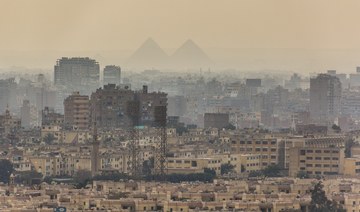DUBAI: A resource crunch and the expansion of new economic sectors in the wake of the coronavirus pandemic could have a major impact on the availability of venture capital (VC) for entrepreneurs in the Middle East.
Yet, even as startups in the region, like their global counterparts, face significant challenges to fundraising, a number of sunrise sectors have emerged in response to coronavirus-linked business and lifestyle challenges, according to Fady Yacoub, co-founder and managing partner at the global technology investment firm HOF Capital.
“While angel investors and family offices accounted for a record-breaking amount of the capital deployed in the region in 2019, COVID-19 has made this source of funding scarce,” Yacoub said. “This is similar to trends abroad, but it is most acutely felt in the region as family offices have historically represented a significant share of invested dollars.”
Global VC funding has plunged 20 percent since the coronavirus outbreak in December last year, data from Startup Genome shows.

Global VC funding has plunged 20 percent since the coronavirus outbreak in December last year, data from Startup Genome shows. (Supplied)
In the Gulf, funding to MENA startups was up 2 percent in the first quarter compared with a year earlier, although the number of venture capital deals fell 22 percent, principally because of a steep drop in March, according to the regional data platform Magnitt.
Given the interruption to business schedules, VCs are doubling down on their holdings, Yacoub said.
“Most VC dollars are being spent on putting out fires at existing portfolio companies rather than on new investments.”
Winning VC funding is now a challenge, even for companies growing in double or triple digits week on week, he said.
“Rounds that were once oversubscribed have had investors walk away, forcing companies to mark down valuations and raise at lower levels per share than their previous round. We have seen this play out with quite a few firms.”

Winning VC funding is now a challenge, even for companies growing in double or triple digits week on week, Yacoub said. (AFP/File Photo)
Yacoub, an Egyptian, teamed up with compatriots Onsi Sawiris and Hisham Elhaddad to found HOF Capital in 2016. The firm is backed by more than 70 influential families and organizations, including leading brands such as Morgan Stanley, Etihad Airways and BNP Paribas.
Its investors have $350 billion of assets under management. HOF focuses its investments on nascent technologies with the potential to solve major social problems, backing entrepreneurs in areas including artificial intelligence software, next-generation finance, and genetics and computational biology.
Yacoub and his colleagues believe the downturn offers an opportunity to launch category-leading businesses. Challenging times present new problems to be solved, creating new market prospects.
Given the widespread changes to lifestyles around the world, Yacoub pinpoints four possible growth sectors:
Remote work: “Beyond tools enabling remote work, we are excited about how this trend will alter the distribution of tech talent. Clusters beyond expensive central locations will emerge in places offering better quality of life or that are closer to home for migrants, even in the MENA region.”
Electronic sports and gaming: As alternatives to live sporting events and other in-person experiences, e-sports and video games have seen player activity levels rise. Yacoub predicts exciting times ahead for the sector, particularly with localized Arabic-language products.

Lockdowns and social distancing have forced consumers to shop online, with regional platforms Noon and Souq enlarging their workforce even as companies in other sectors have laid off staff. (AFP/File Photo)
Telemedicine: Telehealth claims in the US rose by more than 4,000 percent in the year to March 2020. “A similar trend may follow in other countries, which was part of our motivation for investing in Helium Health. Its telemedicine service has seen rapid growth during the pandemic.”
E-commerce: Lockdowns and social distancing have forced consumers to shop online, with regional platforms Noon and Souq enlarging their workforce even as companies in other sectors have laid off staff. “Overall, e-commerce has grown in the GCC and Egypt at a 30 percent compound annual growth rate. Investors will be keen to find the next e-commerce winner in the region.”
With a number of factors expected to affect consumer spending in the medium term, VC funding could be affected accordingly. Yacoub said that founders should expect longer fundraising cycles as VCs look more closely at all aspects of a company’s business model and operating market.
“VC investors are generally exposed to hundreds or thousands of startups each year, so it’s important to stand out from the crowd in a good way, such as having a world-class team, a best-in-class or unique product or technology, market-leading traction, and being able to convey an interesting and compelling story to investors,” he said.
* This report is being published by Arab News as a partner of the Middle East Exchange, which was launched by the Mohammed bin Rashid Al Maktoum Global Initiatives to reflect the vision of the UAE prime minister and ruler of Dubai to explore the possibility of changing the status of the Arab region.


























